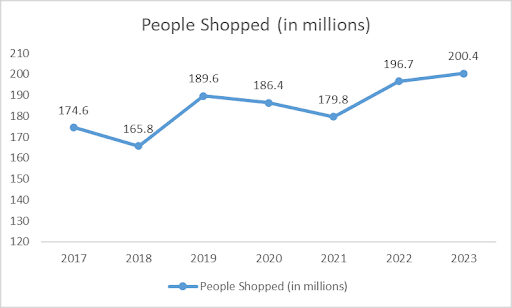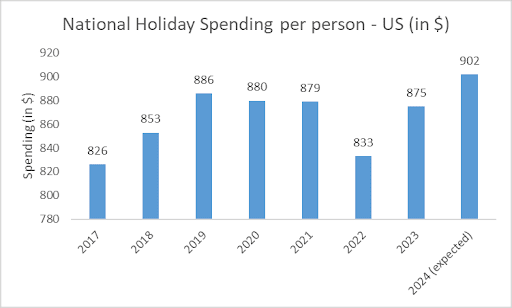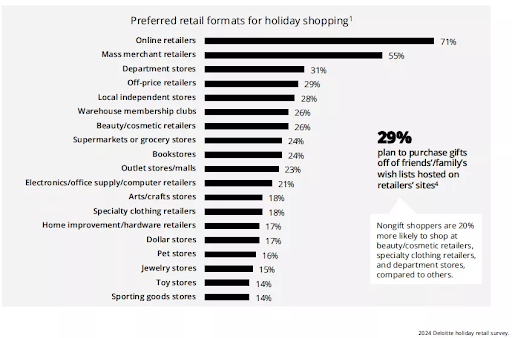Business News
How does Thanksgiving and Black Friday sale impact stock markets?
.png)
4 min read | Updated on November 29, 2024, 13:21 IST
SUMMARY
Thanksgiving and Black Friday kickstart the U.S. holiday shopping season. Retail and e-commerce stocks see significant movements, while India benefits indirectly through IT, e-commerce, and export ties. Mixed stock performance trends exist for S&P 500 and NIFTY50, with economic growth, consumer spending, and rising online shopping driving positivity.

Buoyancy led by Black Friday sale brings cheers to investor sentiments across market
The trend of the U.S. consumer and the retail sector will be in focus this week as Thanksgiving and Black Friday mark the beginning of the holiday season in the United States on November 29th, bringing a mix of festive cheer and economic activity that impacts financial markets.
In the U.S., these events lead to a surge in retail sales, impacting the stock prices of retail, e-commerce, and consumer goods companies.
While Thanksgiving is not celebrated as widely in India as it is in the U.S., the global economic activity surrounding Black Friday has a spillover effect on sectors such as IT and e-commerce due to their strong ties with the U.S. market.
What is Black Friday?
Black Friday is the Friday after Thanksgiving in the United States. It traditionally marks the start of the Christmas shopping season and is the busiest shopping day of the year in the United States. Many stores offer highly promoted sales at discounted prices. Some stores' sales continue to Monday (called "Cyber Monday") or for a week (called "Cyber Week").
Black Friday represents the financial crisis in the United States in 1869 when the gold prices crashed, hurting investors. “Black Friday” was coined in the 1950s in the U.S. It referred to the absenteeism in people's shopping crowds after Thanksgiving, especially in Philadelphia. Currently, it marks the start of the Christmas shopping season, with major sales attracting huge crowds. It is the busiest shopping day in the US, alongside Cyber Monday.
The concept has since globalised, with countries worldwide adopting "Black Friday" sales to mimic the U.S. phenomenon, which is expanding its economic impact.
Thanksgiving shopping
Black Friday sales are the cornerstone of yearly profits for retailers, which run deep discounts on overstock, seasonal, or holiday items.
In 2023, more than 200.4 million people shopped from Thanksgiving Day to Cyber Monday, spending $321 on average. The most commonly bought products were food, clothing, gifts, toys, electronics, and decorations, with total spending exceeding $966 billion.

Retail trends

The trend is witnessing the shift to online and e-commerce channels for holiday shopping. According to Deloitte, 71% of consumers will go online this year. However, brick-and-mortar retailers still show a presence. More than half of holiday shoppers intend to visit big-box retailers, with department stores accounting for roughly one-third.

Market performance
From 2001 through 2023, the S&P 500's overall performance around the Thanksgiving holiday has been mixed, seeing positive returns just half the time. Over that time, the S&P500 had more than 1% gains on just three Black Fridays—in 2001, 2007, and 2012—but fell as much as 1.7% in 2009.
NIFTY50 also showed mixed performance on Black Friday, most of the time closing positive. In the year 2009, NIFTY50 saw a drop of 1.27%, while in 2021, it plunged by 2.91%. Since 2001 eight Black Fridays have gained more than 1%.
US economic trends and its impact
Strong economic trends in the US influence the global and Indian stock markets. For example, if major economies like the U.S. show economic growth during key events like Fed rate cuts and the dollar weakening, it can boost global market confidence, which may benefit India as well.
Consumer spending and Indian markets
Black Friday and Thanksgiving led to higher consumer spending. Indian companies connected to the U.S. market or global trade might see increased demand for their goods and services during this time. This boost in sales could improve earnings, which may positively affect stock prices.
Rising IT and E-commerce trends
The rise in online shopping during Black Friday and Thanksgiving can create opportunities for Indian technology and e-commerce companies. Key small and midcap IT companies hold strong contracts in the US e-commerce space.
Export growth and commodity demand
The high demand during Black Friday and Thanksgiving in the U.S. can boost exports of goods produced in India. India exports key consumer durable, white goods items across the globe.
By signing up you agree to Upstox’s Terms & Conditions
About The Author
Next Story

